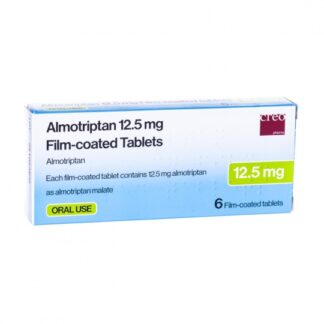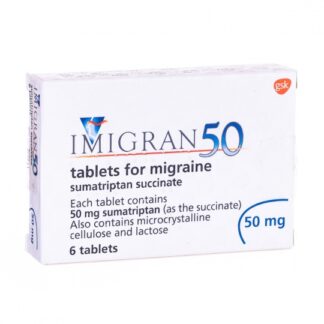Migraine Online Treatment & Help
A migraine is an extreme type of headache that is usually accompanied by nausea, sensitivity to light and vision problems. Some people are more prone to migraines and would even suffer an attack once a week. Because migraines can be agonising and can prevent you from your daily activities, you can choose one of our different effective treatments to prevent or alleviate the symptoms of migraine.
A migraine is an extreme type of headache that is usually accompanied by nausea, sensitivity to light and vision problems. Some people are more prone to migraines and would even suffer an attack once a week. Because migraines can be agonising and can prevent you from your daily activities, you can choose one of our different effective treatments to prevent or alleviate the symptoms of migraine.
What Is The Treatment For Migraines?
There are numerous treatments for migraine available online. They should not be used for the prevention of migraines nor as a treatment for cluster headaches. These treatments belong to the group of medicines known as triptans.
These treatments are highly effective in providing headache relief. At the least, patients felt less painful headaches which allows them to get back to their normal daily routines despite the slight lingering symptoms of the migraine. Migraine treatments also help alleviate other symptoms that accompany a migraine attack such as nausea, vomiting and sensitivity to light or sound.
Migraine treatments are not the same as other ordinary pain relievers. They are intended to alleviate symptoms of migraine only and will not work for other types of pain. People who don’t find relief from taking acetaminophen, aspirin and other pain relievers are usually prescribed migraine treatments.
How Do Migraine Treatments Work?
Migraine treatments are serotonin-1 receptor agonists. They work by narrowing the brain’s blood vessels, alleviating the agonising symptoms of swelling. The treatment also helps reduce other triggers that cause headaches such as noise and light sensitivity, nausea and vomiting caused by migraines. It is a recommended treatment for moderate to severe headaches.
These treatments are effective in providing relief from migraine symptoms. It is best to take the treatment at the onset of a headache that leads to a migraine. It is still effective even if it was taken after the headache has started, but it may take a while to experience relief.
What Are The Benefits Of Using Migraine Treatments?
The treatment provides the benefit of alleviating the symptoms of acute migraine and headaches. It works by lowering the levels of the chemicals in the body that trigger headaches, nausea, vomiting and sensitivity to light.
How Do I Use Migraine Treatments?
Strict adherence to your doctor’s direction is crucial in taking this treatment. Make sure to take time to browse through the Patient Information Leaflet found in the medication packet when you fill your prescription.
Migraine treatment should not be used for longer than instructed by your doctor.
Take the treatment at the early onset of the migraine or as soon as the migraine attack has started.
Benefits Of Using Tru Medical Online Treatment Service
Shipped To You
Select your shipping address and choose from one of our available shipping options including same-day shipping.
Discreet and Secure Service
Your treatment will be delivered in a discreet, unlabeled and unmarked package, ensuring complete discretion.
Online Consultation
Make sure your selected treatment is right for you by consulting with our experts online.
Available Treatments

Almotriptan
- Targets migraines specifically
- Brings relief even if taken at a late stage
- Prevents pain reaction in the brain
- Genuine medication
- Sourced in the UK

Amitriptyline
- Prevents migraine attacks
- Tricyclic antidepressant
- Helps with recurring migraines
- Genuine medication
- Sourced in the UK

Imigran
- Effectively treats migraine symptoms
- Suitable for migraines with or without aura
- Narrows the brain’s blood vessels for relief
- Authentic medication
- Sourced in the UK

Sumatriptan (Generic Imigran)
- Generic Imigran (works exactly the same way)
- Effectively treats migraine symptoms
- Suitable for migraines with or without aura
- Narrows the brain’s blood vessels for relief
Benefits Of Using Tru Medical Online Treatment Service
Shipped To You
Select your shipping address and choose from one of our available shipping options including same-day shipping.
Discreet and Secure Service
Your treatment will be delivered in a discreet, unlabeled and unmarked package, ensuring complete discretion.
Online Consultation
Make sure your selected treatment is right for you by consulting with our experts online.
How Does The Online Treatment Service Work?
Consultation
Fill out our online questionnaire our experts will examine.
Checkout
If you are eligible for the treatment, you will be sent to the checkout page.
Start Your Treatment
The selected treatment will be delivered to your address.
Frequently Asked Questions
What Are Migraines?
Migraines are a common medical condition defined as a headache. Migraines usually involve moderate to severe headaches. They may be followed by other symptoms including sickness and nausea.
Migraine affects approximately 1 in 7 people. The condition is more common in women. It may occur at any age but usually manifests between the ages of 25 and 55. There are several types of migraines, but the most common one is migraine without aura.
Some people experience migraines with an aura, which is a condition such as pins and needles that occurs prior to a migraine attack.
Chronic migraines are diagnosed in patients who experience a headache at least 15 days a month.
What Causes Migraines?
Although the condition affects a lot of people, there is still a lot we don’t know about migraines. It is often linked to a change in brain activity which temporarily affects the blood vessels, nerve signals and chemical messengers.
Migraines can be caused by a number of factors and triggers including:
- Head trauma
- Lack of sleep
- Hormonal changes
- Stress
- Emotional triggers
- Certain treatments
- Missing meals
- Alcohol abuse
- Caffeine
- Certain foods
- Dehydration
What Are The Symptoms Of A Migraine?
The main symptom often associated with migraines is an intense headache, moderate to severe pain. The pain usually occurs on one side of the head and can cause a throbbing or pulsing sensation. It may get worse with movement and prevent you from going about your everyday tasks. The headache usually lasts between 4 and 72 hours.
Sometimes, these headaches may be followed by other symptoms such as:
- Sickness
- Vomiting
- Nausea
- Light and sound sensitivity
- Diarrhoea
- Sweating
- Trouble concentrating
Migraines With Aura involve symptoms that occur right before a headache onset. These symptoms act as a warning. They develop over a short period, usually less than half an hour before a headache. These symptoms include:
- Dizziness
- Pins and needles
- Trouble speaking
- Numbness and tingling
- Visual issues (seeing stars, blind spots, flashing lights or temporary blindness)
How Is Migraine Diagnosed?
There is no effective way to diagnose whether someone has a migraine. Your doctor will make a diagnose based on the severity of your headaches as well as the associated symptoms and how you respond to migraine treatments. Diagnosis can take some time depending on the frequency and severity of the symptoms associated with migraines.
If you suspect you are suffering from migraines, you can keep a log to make diagnosis easier for your GP. This log should include:
- Time and date of your migraine attacks
- Your activity at the time
- Any apparent or suspected trigger factors
- The stages of migraine you experienced
- The symptoms you experienced
- What medication you took and did it help
Based on what you write down in your migraine diary, the symptoms and your response to therapy, your doctor will be able to make a diagnosis.
How Long Does A Migraine Last?
Migraines usually last between 4 and 72 hours. If someone is experiencing migraine with aura, the early symptoms usually last between 5 minutes up to an hour.
What Should I Do When I Have A Migraine?
Migraine affects people differently. Some find it lying in a dark room helps prevent further aggravation of the symptoms. The main treatments used during an attack are sickness medicines and painkillers or triptans.
Can I Prevent A Migraine?
The most effective way to prevent a migraine is to identify and avoid the triggers. Keeping a diary of your migraine attacks will help you identify what triggers an attack and can help you learn how to avoid it.
Here are some of the most common migraine triggers:
- Emotional triggers such as anxiety, stress, tension, depression and excitement.
- Physical triggers such as working different shifts, tiredness, shoulder tension, jet lag, excessive exercise.
- Dietary triggers such as poor diet, irregular eating habits, alcohol abuse, caffeine, specific foods and others.
- Environmental triggers such as flickering or bright lights, smoke, loud noises, strong smells…
- Medical triggers such as oral contraceptives, sleeping pills, hormone replacement therapy…
- Hormonal triggers such as periods, menopause, going through puberty…
If you experience migraines for more than 5 days a month, you might want to ask your GP for preventive treatment. There are a lot of migraine treatments available, which may be beneficial if you experience frequent or severe migraines.
If you fall into this group, you should schedule an appointment with your doctor to discuss available migraine treatments.
How Is A Migraine Different To A Headache?
Usually, migraines are more intense than headaches. They usually affect only one side of the head and cause a pulsing or throbbing sensation. Sometimes, the headache is followed by other symptoms including vomiting, nausea, light sensitivity and trouble focusing.
What Are The Stages Of A Migraine?
Some people experience migraines in stages. These stages include:
- Pre-headache symptoms such as mood swings, energy level drops, appetite changes.
- Aura – Temporary symptoms such as pins and needles and visual disturbances
- Headache onset
- Resolution, often followed by fatigue but without any other symptoms.
